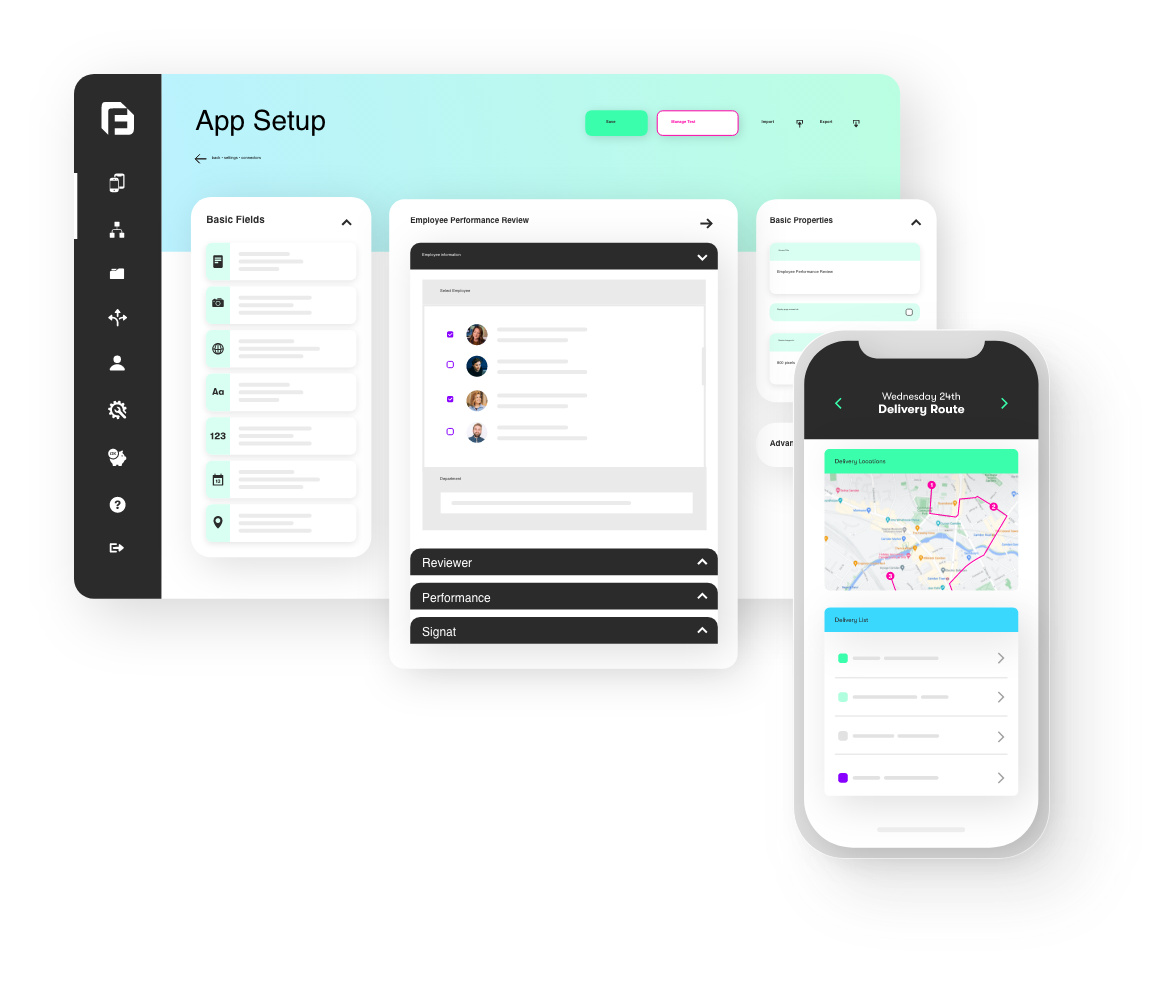Digital transformation is more than reducing paper usage. We discuss the benefits of digital business transformation and how innovating through effective use of mobile business apps helps your enterprise make money and create positive change
Digital transformation is something all businesses need to embrace in the face of an ever greener, ever-changing digital landscape. But what is digital transformation? How will it improve your business and how can you implement digital transformation effectively?
In this article, we’re going to answer a range of questions surrounding digital transformation, discuss the benefits and provide some real-world examples of how enterprise operations can be drastically improved at all levels through defining and then implementing innovative digital solutions such as the forms2 platform.
We’ll discuss:
- What is digital transformation in business?
- Why should organisations and enterprise businesses invest in digital transformation including the use of mobile apps?
- What are the benefits of digital transformation?
- How do I implement digital transformation?
- How forms2 has helped enterprises realise digital transformation goals
What Is Digital Transformation?
In short, digital transformation is a term used when any business process has been migrated to or enhanced by digital technologies. Swapping paper forms to mobile forms is a fundamental digital business transformation, and digitising data and data collection for accurate reporting is another.
Any business process or strategy that has been improved by the use of software or platform, be it a business app or other digital product can be defined as digital transformation. Take the likes of Uber or Just-Eat – you no longer have to call someone to place an order as an app does it all for you.
A business app that helps new franchisees get up to speed with standard operating procedures regardless of where they are in the world and a digital reporting system that lets you know which hotel room has been cleaned instantly; these are all further examples of digital transformation.
Why should organisations and enterprise businesses invest in digital transformation through mobile apps?
When you’re thinking about digital transformation, it’s easy to get hung up on the complicated ‘digital’ side of things. Questions like “oh how long will it take me to learn this process” etc. may come up. But it’s the transformation element that you need to consider more so.
By implementing a digital transformation strategy, you can completely change the way your employees work together and how the business operates for the better, seeing results sometimes in a matter of days.
The key reasons enterprises choose digital transformation with the likes of business apps, is because it helps businesses reduce costs, improve efficiency and increase revenue. It does this by reducing costs associated with paper and man-hours dedicated to reporting time, provides an accurate data capture service and communication channel and helps increase revenue by improving time-to-market through Citizen Development.
According to a study by MIT, Digitally mature companies are 26% more profitable than their less mature peers. Can you afford not to be?
In any industry, businesses need to embrace digital transformation to stay ahead of competitors, better serve customers and improve business workflows.
One of the most effective ways to see improvement within a business is to migrate paper forms to mobile forms, and embrace mobile apps. Businesses that digitise data are already ahead of the curve. But there are lots more benefits!

What are the 11 benefits of digital transformation?
In the world of business apps, mobile forms and cloud-based IT solutions such as Google Workspace, digital transformation does more than simply replace paper forms, it connects teams wherever they are in the world and helps you make accurate business decisions armed with the correct data and decrease time to market when you’re launching new services. You work smarter, while the platform works harder.
Let’s look at some of the benefits of digital transformation and how it helps businesses improve workflows:
1. Reducing costs
The major benefit of introducing digital transformation into any enterprise is the reduction of costs. Storing paper forms, costs associated with man-hours spent on reporting, lost time chasing up inaccuracies in data and even missing stock all add up.
You can automate processes such as stock replenishment through triggered actions, ensuring you’re always up to date with stock, you can automate email sends after a task is completed and reduce the costs of paper by simply not using paper!
In fact, European Camping Group saved £277,000 per year and reduced paper usage by 76.67% with forms2. Read the full case study here.
In addition, you can upskill the existing workforce into low-code/no-code citizen developers, solve the knowledge gap and reduce the need for additional IT teams.
2. Eradicating reporting errors
Digital transformation can almost completely eradicate reporting errors through the use of mobile forms and business apps for collecting data. This benefit alone is one of the key reasons businesses choose to innovate with digital transformation. Paper forms can get lost, filled out incorrectly or can become damaged in transit. In some cases, paper forms are simply ignored by field teams, leaving massive gaps in reporting and hindering the decision-making process, potentially costing you money.
Implementing digital transformation through mobile apps and cloud-based data solutions is the most effective way to eradicate reporting errors. Field teams collect critical data and information is passed down thanks to mandatory fields that do not allow the user to complete a task until they have filled out the correct information using specific sections on a form.
No more chasing up incorrectly filled out forms! Just one of the benefits of mobile business apps for enterprise use!
For example, our client Japanese Knotweed was able to take accurate pictures of their jobs so field teams would arrive with the correct information and be able to make accurate decisions before arriving on site. Read our mobile forms and business apps case studies.
3. Connect with your internal systems
In businesses where timely reporting is essential, regardless of whether it’s in retail, industry or hospitality, accurate capture and reporting of field service data at speed can make all the difference. By digitising your paper forms into mobile forms and bringing all data reports into one platform, you can connect the data from different teams with your existing systems and back office.
With the use of mobile phones and tablets, it’s easier than ever to implement and utilise digitised data and connect with your own systems via our integrations and API solutions.
With digital forms and mobile business apps, field teams can collect data on the scene and report accurate findings to the back office instantly. You can specify that all data points must be completely filled out as accurately as possible, providing immediate action points and up-to-date information on selected events or job-specific tasks. At the push of a button, you can connect your data to the right applications, trigger actions and create faster workflows.
Where paper forms may have taken hours or days to report, mobile business apps thanks to digital transformation processes can do it in seconds.
Whether you want to trigger an email to the client as soon as a job is completed or let the marketing department know it’s safe to push out those social media posts when an action is completed – seamless integration with your internal systems through the forms2 platform is simple and very useful.
4. Immediate access to data
When a paper form goes missing, it can be disastrous. Tasks can be missed, invoices unpaid and decisions stalled. Add to that the time wasted by manually handing in paper forms to admin staff and the laborious manual data upload – you simply don’t have the time to waste waiting for accurate data when you need to make a business decision.
When migrating to business apps and mobile forms, expenses in manual admin costs, paper and storage can be drastically reduced, you can also benefit from the increased agility accurate data provides.
You no longer have to wait days for one team to submit a paper form and then assign another team to the task. Data can be instantly passed between administrators, team leaders and managers so they can trigger actions from field teams, report to customers or respond to any immediate issues. Decisions can be made in minutes, not days thanks to digital information.
In a study by Deloitte, it found that companies that have higher digital maturity reported 45% revenue growth compared to 15% for lower maturity companies (Deloitte, 2020). What improvements could you make within your business with complete access to all of your data?
5. Optimised workflows
Mobile business apps and cloud-based solutions allow team leaders to analyse the performance of their teams. When you can see what your teams are working on, where the stumbling blocks or bottlenecks may be or where they need help, you can make appropriate adjustments to speed up workflows and assist when needed.
Nu Quantum found that Google WorkSpace helped them achieve their business goals faster by collaborating within a cloud-based system. Read the case study here.
6. Automating manual processes
Through the use of automated tasks and automation of manual processes, you can save time, set predefined rules in the reporting process and reduce human error when it comes to collecting data.
Busy field teams may forget to let other teams know when a job is finished, report to managers or report specific aspects to a customer on completion. By automating these tasks through mandatory fields, you no longer have to worry about reminding teams to check-in at certain times for safety reasons or send emails to clients when a task is completed. With the forms2 platform, you can set push notifications to remind teams to check-in, arrange for emails or tasks to be automatically triggered once certain parameters have been filled in an app or simply let managers know that teams are on the ground through GPS location tracking.
By automating manual reporting tasks, you remove the margin for human error and still receive the data you need.
Air Link Systems were able to save 600,000 minutes. 416 days. And around £30,000 in admin alone thanks to automated tasks within mobile business apps. Read how Air Link Systems achieved this by automating manual reporting tasks.
7. Connect with teams worldwide
Effective collaboration between teams helps businesses to grow. When teams are connected, they can move towards a shared business goal armed with the knowledge they need. Cloud platforms like Google Workspace, previously G Suite, allow teams to message each other across a monitored platform, share and edit projects in real-time via Google Drive and access data wherever they are in the world, with the ability to collaborate on specific tasks.
In addition, teams across the globe can look up vital information based on previously completed tasks to make accurate decisions before actioning any work. You’ll know then and there if the job has been approved, altered or completed.
European Camping Group were able to share data and connect their European teams through a standardised platform regardless of location or phone signal and make better decisions at work armed with accurate data everyone could understand. Read the case study here.
8. Standardised process
When it comes to staff handbooks, updates can be made with one version without being rolled out to others. Franchise owners may have one process whereas another in a different location has something different altogether.
By transferring a standardised process into the digital world, everyone is working from the same handbook. Franchise owners can enjoy a smoother onboarding process, teams know exactly what standard processes are for dealing with issues and managers can maintain excellent standards of practice as all the information they need could be contained within a digital business app.
9. Increased security and compliance
Lost, damaged or misplaced paper forms can result in serious data breaches, destroying reputations and costing you thousands. In addition, if you were to store all of your customer or vendor details on paper and they were to become damaged, the results could be disastrous.
You can enjoy increased security whilst staying compliant with global security and privacy regulations such as GDPR, CCPA and HIPPA when you transfer your data to the likes of the forms2 platform. Your data is safe with our enterprise-level global security compliance as standard. There are no paper forms to get lost!
10. Accountability
One of the key reasons businesses need it, and a major benefit of digital transformation is the accountability that it brings. Allowing teams and individuals to take ownership of tasks, enabling managers to assign tasks to specific people and even allowing clients or customers to sign off tasks digitally allows for accountability at all levels.
Managers can see when jobs have been completed and by who, clients can see the sign off processes and nothing is left to memory. All the information you need is in front of you.
MAAC Heating and Cooling enjoyed a reduction in admin tasks and protected their team through accountability as staff no longer had to spend time on calls with clients, explaining or trying to prove work had been done through proof of work forms. Read the case study here.
11. Improved customer experience
Instant reports to customers, improved customer experience and complete transparency with clients – three key elements that will help your customer retention which can all be facilitated through business apps and digital transformation.
By providing customers with all the details they need and keeping them updated without them having to chase you for information, you take a proactive approach to customer service. Whether through triggered emails, push notifications or scheduled calls, you can automate processes that help you build better relationships with clients.
Just like ART Systems which enjoyed increased customer retention thanks to automation.
“Within 10 minutes of an engineer leaving site, the customer and the reseller will have had detailed communications to say a job had been completed. Or, if the job had not been completed, the details of what we had done so far would be sent and a message would be automatically sent to say the client would be contacted by the office to schedule another call.
We became much more efficient. So overall customer experience improved massively.” Read how Art Systems saved 114-days and £40,000p.a. with forms2 mobile forms and apps. Read the case study here.
How can I implement digital transformation?
Of course, there are many ways to implement digital transformation, whether it’s through shared folders instead of ring binders, a central blog instead of a newsletter or even a complete overhaul of reporting systems by migrating them to a digital platform such as forms2 complete. You need to address business goals, get buy-in from business leaders and build your digital transformation blueprint.
However, it can be a lot easier than you think – and we can help with that!
The three key enablers of effective digital transformation are:
- Business apps
- Mobile forms
- Cloud Systems
Here’s a scenario for you: Let’s say you have an engineer with a job to complete on a construction site. Once the job is addressed, they need to log in to a centralised system in the field without a computer in sight and let your team know that the job has been completed. They then need to let the customer know of any issues and the back office needs to generate an invoice.
That’s a lot of steps to take…
Here’s how it would work with forms2 in just three steps.
Step 1
You could create a business app that any of your teams can use and log in to on their smart device, anywhere in the world even if there’s no signal.
Step 2
You could replicate any paper form you have within your business and create a digital version. Each field would be mandatory to ensure that every detail is captured, including images, geolocation and contactless signatures. Once the job is completed the engineer can fill out the relevant forms and submit them.
Step 3
Once submitted, the form would upload to your cloud systems, such as Google Workspace and everyone in your organisation who needs to know, would not only be notified of the completed task but can then move on to the next project. Jobs can be marked as completed, clients can be sent details and the back office can generate an invoice automatically.
All after a click of a button.
This is just one example of how digital transformation can revolutionise business processes.
You can even write toolbox talks faster too!
Read how forms2 has helped enterprises realise digital transformation and improve innovation
Through using the forms2 platform and innovating with effective digital transformation, global brands such as Air Link Systems, European Camping Group and more have been able to save thousands in lost revenue, connect teams and drastically reduce reporting errors.
Find out how automation helped Japanese Knotweed LTD’s employees improve work-life balance and make accurate business decisions with streamlined data entry using forms2 mobile forms and apps.
Read how Cambridge scientists unlocked the doors to the Quantum world supported by Google Workspace and forms2 and brought their teams together during a global pandemic.
And read how Well, Steve H at Art Systems managed to free up 114 days a year in man-hours and rescue £40,000+ in wasted revenue with forms2.
View a full selection of forms2 case studies and testimonials.
Can you afford to wait?
Speak to a platform specialist at forms2 and build your own scalable Android, iOS and Windows business apps and mobile forms in hours, not months.


